Maintaining healthy skin is of utmost importance. The skin is our first line of defense against our environment and is more likely to receive damage than most organs. Our skin is assaulted by ultraviolet radiation (UVR), chemical exposures, mechanical damage, and infectious agents on a daily basis (1). What’s worse, damage from everyday exposure to our environment leads to visual signs of aging and structural damage. Healthy skin may be taken for granted until signs of damage and aging are apparent. Luckily, there are three tips to keep healthy and beautiful skin. These tips will help reduce the damage in skin and can help produce healthy skin.
Avoid Sun Damage
Chronic exposure to UV radiation is recognized as the most significant environmental challenge to skin. Radiation leads to the production of reactive oxygen species (ROS), molecules that cause oxidative damage to cells and the extracellular matrix.
Chronic UV exposure damages both dermal and epidermal layers of skin. This type of damage is known as photoaging and includes a loss of elastic and collagen fibrils, abnormal skin pigmentation, and inflammation. Over time, visible signs of premature aging such as wrinkles, saggy skin, and age spots may appear.
There are plenty of ways to avoid and limit sun damage, especially to the face and neck. This may be as simple as wearing a hat and sticking to the shade as much as possible. Sunscreen lotions help lower UVR damage by blocking and spreading UV radiation. These lotions, however, are a form of chemical exposure and may not be tolerated by every individual. Do some research or consult a dermatologist to find the right sunscreen for your skin.
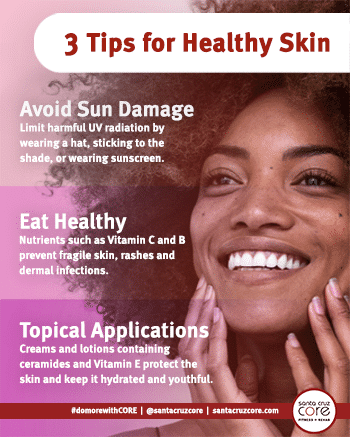
Eat Your Produce!
There is a lot of evidence that highlights the importance of nutrients for skin health, especially antioxidants. Vitamin C, for example, is so important to skin health that a deficiency in it causes fragile skin and impairs the healing of wounds. Similarly, vitamin B deficiencies may cause skin rashes and can predispose skin to fungal infections.
Eat plenty of fruits and veggies since these are a major source of micronutrients such as vitamins and other antioxidants. Antioxidants are important because they limit damage from UVR by neutralizing the harmful oxidative agents it generates, promoting healthy skin.
Topical Applications
Certain topical applications help keep the skin hydrated and protected from environmental insults. Vitamin C and E are well-recognized for their antioxidant and protective functions against UVR. Only vitamin E, however, has the chemical properties to penetrate the outermost layer of the epidermis, called the stratum corneum. Therefore, it is best to get vitamin C through diet (produce, not supplements), while vitamin E is still effective as a topical.
Creams and lotions containing ceramides keep the skin hydrated and youthful. Ceramides are lipids that account for about 50% of all lipids of the stratum corneum, which serves as a barrier to the environment.
When it comes to skin, everyone is different. Tips and tricks that work for one individual may not work for everyone. Do some research, or better yet, consult a licensed esthetician to receive a personalized skin care plan.
References-
- Pullar, Juliet M, et al. “The Roles of Vitamin C in Skin Health.” Nutrients, vol. 9, no. 8, Dec. 2017, p. 866., DOI:10.3390/nu9080866.
- McArdle, et al. “Effects of Oral Vitamin E and β-Carotene Supplementation on Ultraviolet Radiation-Induced Oxidative Stress in Human Skin.” OUP Academic, Oxford University Press, 1 Nov. 2004, https://academic.oup.com/ajcn/article/80/5/1270/4690431.
- Chen, Ying, and John Lyga. “Brain-Skin Connection: Stress, Inflammation and Skin Aging.” Inflammation & Allergy Drug Targets, Bentham Science Publishers, 2014, https://www.ncbi.nlm.nih.gov/pmc/articles/PMC4082169/.



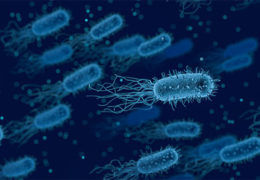
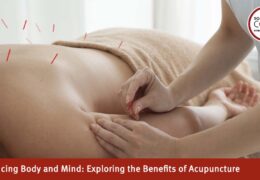



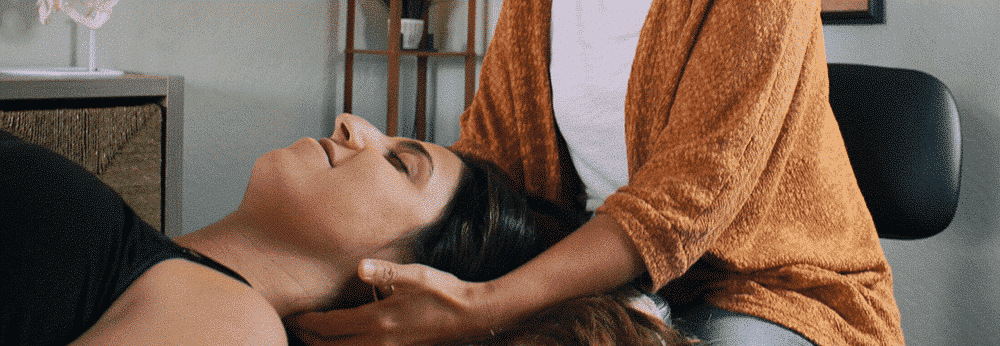
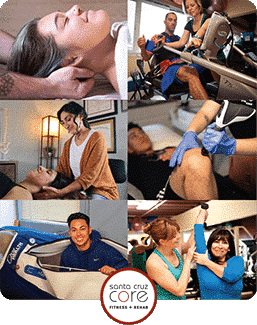
A diet rich in vitamin C and low in fats and sugar promotes radiant skin. Consider a low-sugar diet, which can keep insulin levels down, allowing cells to maintain a healthy balance.
Thank you for your comment! Yes, proper nutrition and hydration will always be the best thing we can do for our health and skin.